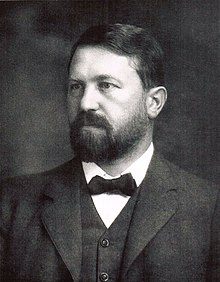Theodor Boveri | |
|---|---|
 | |
| Born | 12 October 1862 |
| Died | 15 October 1915 (aged 53) Würzburg, Kingdom of Bavaria |
| Nationality | German |
| Known for | Embryonic development Boveri–Sutton chromosome theory Centrosome Chromosome theory of cancer |
| Spouse | Marcella Boveri |
| Children | Margret Boveri |
| Scientific career | |
| Fields | Genetics, Cell biology |
Theodor Heinrich Boveri (12 October 1862 – 15 October 1915) was a German zoologist, comparative anatomist and co-founder of modern cytology.[1] He was notable for the first hypothesis regarding cellular processes that cause cancer, and for describing chromatin diminution in nematodes.[2] His brother was industrialist Walter Boveri. Boveri was married to the American biologist Marcella O'Grady (1863–1950).[3] Their daughter Margret Boveri (1900–1975) became one of the best-known journalists in post-World War II Germany.[4]
- ^ Manchester, K L (July 1997). "Overlooked Nobel laureates". Adler Museum Bulletin. 23 (2): 20–1. PMID 11619485.
- ^ Baltzer, F (May 1964). "Theodor Boveri". Science. 144 (3620): 809–15. Bibcode:1964Sci...144..809B. doi:10.1126/science.144.3620.809. PMID 14149391.
- ^ Satzinger, Helga (March 2008). "Theodor and Marcella Boveri: chromosomes and cytoplasm in heredity and development". Nat. Rev. Genet. 9 (3): 231–8. doi:10.1038/nrg2311. PMID 18268510. S2CID 15829893.
- ^ Baltzer, Fritz (1967). "Theodor Boveri: The Life of a Great Biologist 1862–1915". Archived from the original on 28 February 2005. Retrieved 22 July 2007.. Extract published in Gilbert, SF (2006). DevBio: a companion to Developmental Biology, 8th ed. Sinauer Associates.